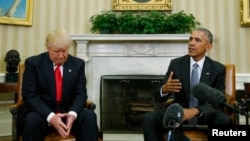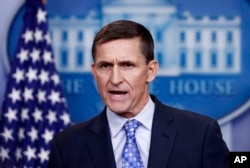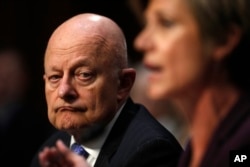Former U.S. President Barack Obama personally warned then President-elect Donald Trump against naming retired Army General Michael Flynn as his national security adviser, but Trump picked Flynn anyway, only to fire him after 24 days on the job.
Obama issued his warning against Flynn's hiring in a 90-minute meeting with Trump at the White House on November 10, two days after the real estate mogul pulled off one of the most stunning upsets in U.S. presidential election history by defeating former U.S. Secretary of State Hillary Clinton.
Obama had fired Flynn as chief of the Defense Intelligence Agency in 2014 because of his disruptive management style.
White House spokesman Sean Spicer, confirming media reports of Obama's warning to Trump, said it was no secret that Obama "wasn't exactly a fan" of Flynn, who as a Trump political surrogate had assailed Obama's performance as president.
WATCH: Obama ‘Wasn’t’ Exactly A Fan of Flynn’s,’ Spicer Says
Spicer, however, questioned why the former president's administration didn't strip Flynn of his 2016 security clearance.
"Why did the Obama administration let Flynn go to Russia for a paid speaking engagement and receive a fee?" Spicer said. "There were steps that they could have taken that - if that was truly a concern."
Flynn was paid more than $30,000 for a Moscow trip in 2015, where he sat next to Russian President Vladimir Putin at a dinner celebrating the 10th anniversary of the Kremlin-sponsored Russia Today television network.
The former president's warning against hiring Flynn came to light hours before a Senate panel Monday started a new hearing into Flynn's hiring at the White House, Russian meddling in the presidential contest aimed at helping Trump win and connections between aides to Trump and Moscow interests.
Trump has disparaged the several investigations linking his campaign to Russia, saying they are mere excuses for Democrats losing the election.
Sally Yates, who was briefly acting attorney general, the country's top law enforcement official, in the early days of the Trump administration before the new president fired her, told a Senate Judiciary subcommittee Monday that she warned White House officials just after they assumed power January 20 that Flynn had lied to Vice President Mike Pence when he said he had not had contacts with Russia's ambassador to Washington Sergey Kislyak.
Routine intercepts had shown that he had, indeed, talked with the diplomat, Yates said.
Pence, relying on conversations with Flynn, told television interviewers that the new national security adviser had not talked with Kislyak in the weeks before the new administration assumed power.
Yates said, "We knew it not to be the truth."
She added, "The underlying conduct of Mr. Flynn was problematic. We were concerned that the American public had been misled" and left him vulnerable to being blackmailed by the Russians.
"You don't want your national security adviser compromised by the Russians," she said.
Eighteen days after first learning of Yates's concerns, Trump fired Flynn, saying he no longer had confidence in having him as a key White House adviser.
Trump, not wanting to give credence to any Russian link that undermines the legitimacy of his election victory, blamed the Obama administration in a comment on his Twitter account for approving "the highest security clearance" for Flynn, and he said "the Fake News [mainstream U.S. media] seldom likes talking about" Flynn's security clearance granted by the Obama administration.
While Flynn had the clearance, investigators say he failed to disclose the Russian payment and another one for more than $500,000 to represent Turkey. He accepted the payments, the investigators say, after specifically being warned when he retired from the military to not take money from foreign governments.
Trump, in another Twitter comment, said the Senate panel ought to ask Yates "under oath, if she knows how classified information [the intercepted Kislyak calls] got into newspapers soon after she explained" it to White House lawyers. She was asked the question and said she did not know how the leak occurred.
James Clapper, Obama's director of national intelligence, told the committee that the Russian interference in the U.S. election exceeded Moscow's "wildest expectations." He said it was aimed to "demean Secretary Clinton and advantage Mr. Trump."
Clapper was instrumental in the U.S. intelligence community's conclusion that Russia sought to boost Trump's chances of winning the election by hacking into the computer of the campaign chief for Clinton.
The anti-secrecy group WikiLeaks subsequently released thousands of emails in the weeks before the election that showed embarrassing behind-the-scenes Democratic operations aimed at helping Clinton win her party's presidential nomination.
Clinton last week partly blamed her upset loss to Trump on the release of the emails before the November election.
Trump continues to downplay the congressional investigations of Russian meddling and a probe by the FBI, the country's top law enforcement agency, into whether Trump campaign aides criminally colluded with Russian interests to help him win.
Last week, he again rejected the official view that Russia hacked into the computer of Clinton campaign chief John Podesta, saying that it "could have been China, could have been a lot of different groups."









